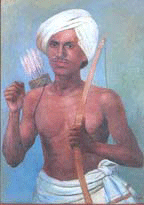 People's Democracy
People's Democracy
(Weekly
Organ of the Communist Party of India (Marxist)
No. 22
June 03, 2007
(Weekly
Organ of the Communist Party of India (Marxist)
|
Vol.
XXXI
No. 22 June 03, 2007 |
June 9: Remembering Birsa Munda’s Martyrdom

J S Mazumdar
BIRSA Munda was one of the tallest and the last among the tribal leaders, who led tribal revolts for 118 years against British Raj, landlords and money lenders in the area of present day Jharkhand. Birsa was born on November 15, 1875 in village Ulihatu in Ranchi district. He died in 1900 at the age of 25 during imprisonment in Ranchi jail. As a tribute to his martyrdom, Jharkhand state was created on Birsa Munda’s birthday, November 15, in 2000.
Birsa Munda was influenced by and later led Sardar movement. Sardar movement of Munda tribes (1858-81) of Ranchi and adjoining areas was for mulki larai (struggle for land) mainly against British government and landlords and for restoration of their lands and against forced labour. To appease the Mundas the British government defined and determined the bhuinhari rights on land. During his study in a Christian missionary school at Chaibasa, he protested and left the school when sardars were called as cheats.
Birsa led a religio-social reform movement among Munda tribes. He forbade worship of spirits, which was widely practiced by the tribals, and opposed idol worship. He preached that there was only one god and the dharti (earth) symbolised the nature. The Mundas and the nature are integrated and could not be separated. He opposed polygamy, which was common among the tribals, and preached that it was a sin. He conceived a code of morals which preached that theft, deception, drunkenness, murder were sinful. His followers called him Bhagawan (god) and Dharti Aba (father of earth).
During 1883-84, British government vested all waste land of villages into ‘protected forest’ under Indian Forest Act, 1882. They started restricting the rights of the forest dwelling communities. Birsa was deeply disturbed by this act of the government and dispossession of tribal lands by zamindars and outsiders (dikus). He and his followers were deeply convinced that it was their inherent traditional rights on jal, jangal and jamin (water, forest and land). He gave call of ulgulan (revolt). Under his charismatic leadership the Mundas rose in revolt (1895-1900) to establish Munda Raj freeing their water, forest and land from the foreign British Raj and native zamindars. They refused to pay tax on land. Birsa raised his voice against the native and tribal administrators and tax collectors. He was arrested in 1895 and was given 2 years rigorous imprisonment. He was released in November, 1897. Once outside, he once again organised the Mundas and launched struggle with traditional arms in 1899. Mundas joined him irrespective of their religious faith, including the Christians. Insurrection broke out in large areas in present day Ranchi and Gumla districts. British army brutally suppressed the revolt and arrested him on February 3, 1900. It was suspected that the British poisoned him when he was incarcerated in Ranchi jail which caused his martyrdom on June 9, 1900. His name will always be remembered for his immense courage in the battle against the British colonisers and the landlords and for his commitment to the cause of tribal rights.
Long Live Birsa Munda!